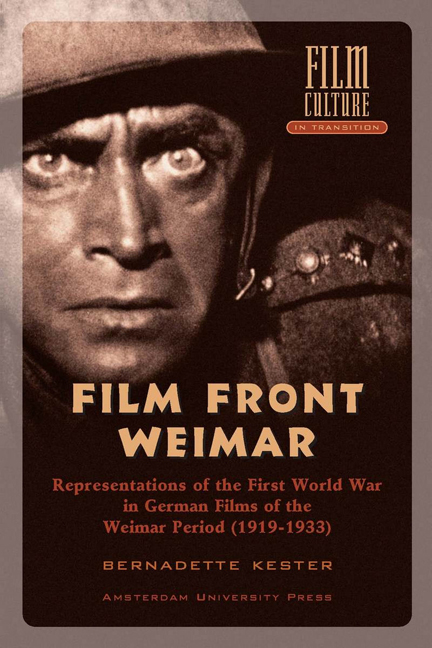 Filmfront Weimar
Filmfront Weimar Book contents
- Forntmatter
- Contents
- Preface and Acknowledgements
- Introduction
- Chapter 1 ‘Lehrreich Und Amüsant’ – Historical Films in the Period 1896-1933
- Chapter 2 ‘Die Legende von der Unschuld’ – Films about the Run-Up to the war, Especially 1914. DIE LETZTEN TAGE VOR DEM WELTBRAND
- Chapter 3 ‘Das Dokumentarische Gewinnt die Oberhand’ – Archival Footage and Constructions in War Films
- Chapter 4 ‘Wenn Wir Helden Wären, Wären Wir Schon Längst Daheim’– Realism and Anti-War Tendencies in Four Films
- Chapter 5 ‘Auf Dem Meere, Da Ist Der Mann Noch Etwas Wert’ – Films About the German Navy During The First World War
- Chapter 6 ‘Neid, Leid, Tränen – Das Ist Der Krieg’– Gender and War Films
- Epilogue
- Notes
- Credits Weimar War Films
- Archives and Libraries
- Bibliography
- Index of Names
- Index of Subjects
Preface and Acknowledgements
Published online by Cambridge University Press: 15 January 2021
- Forntmatter
- Contents
- Preface and Acknowledgements
- Introduction
- Chapter 1 ‘Lehrreich Und Amüsant’ – Historical Films in the Period 1896-1933
- Chapter 2 ‘Die Legende von der Unschuld’ – Films about the Run-Up to the war, Especially 1914. DIE LETZTEN TAGE VOR DEM WELTBRAND
- Chapter 3 ‘Das Dokumentarische Gewinnt die Oberhand’ – Archival Footage and Constructions in War Films
- Chapter 4 ‘Wenn Wir Helden Wären, Wären Wir Schon Längst Daheim’– Realism and Anti-War Tendencies in Four Films
- Chapter 5 ‘Auf Dem Meere, Da Ist Der Mann Noch Etwas Wert’ – Films About the German Navy During The First World War
- Chapter 6 ‘Neid, Leid, Tränen – Das Ist Der Krieg’– Gender and War Films
- Epilogue
- Notes
- Credits Weimar War Films
- Archives and Libraries
- Bibliography
- Index of Names
- Index of Subjects
Summary
People have often wondered why I chose to spend so much time of intensive research on a subject so loaded with violence and human suffering. In daily life I am known as someone more interested in harmony and balance than in conflict and extremes. Maybemyfascination for historical events of violence originated from the need to understand how people can cope with such tragic and extreme experiences.War is the situation which produces the greatest upheavals in the life of individuals as well as nations. In what way do people come to terms with such devastating experiences? How have the books and films about the First World War, made in Germany, contributed to the act of coming to terms with a past so difficult to digest? Aclose reading of German war films made during the Weimar period and of the way these films were received might lead to answers to these questions.
Ahistorical investigation requires years of effort and struggle with the remains of an unmanageable past, especially because this work of research involves several subdisciplines: besides film studies – film history in particular – historiography, military history and press history. Thanks to the sincere interest in the subject and the valuable criticism of a number of people with various backgrounds, it was possible to master the different angles and perspectives to complete this book.
Prof. Piet Blaas (Emeritus professor) was a great inspiration, not least because of his enthusiasm for the subject. Prof. William Uricchio (MIT and the University of Utrecht) and the participants of the seminar he instigated were a constant and stimulating influence. I also owe a great deal to Dr André van der Velden, a most critical reader and a good companion during our walks through Berlin.
I am also grateful for the valuable advice of, among others, Dr Bas Schot (University of Leiden) and Dr Annette Förster during the final phase of actually finishing the book that was first published in Dutch in 1998. I thank Prof. Thomas Elsaesser for encouraging me to publish my book in English. Last but not least, I would like to express my feelings of appreciation to the friendly people of the Bundesarchiv/Filmarchiv in Berlin where I did most of the research; they were of great help. During the periods I spent in Berlin I had the privilege to stay with Renate Assmus, who has become a dear friend.
- Type
- Chapter
- Information
- Filmfront WeimarRepresentations of the First World War in German Films from the Weimar Period (1919–1933), pp. 9 - 10Publisher: Amsterdam University PressPrint publication year: 2002


